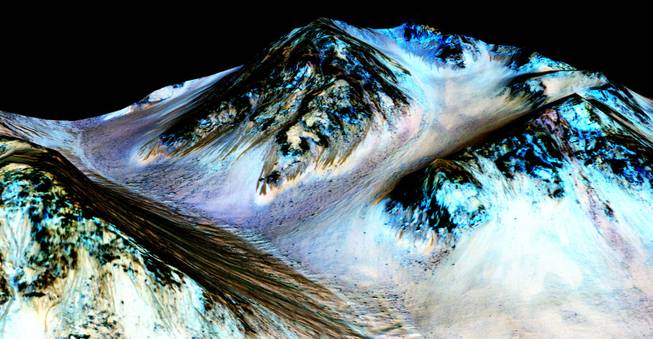
NASA/JPL/University of Arizona / AP
This undated photo provided by NASA and taken by an instrument aboard the agency’s Mars Reconnaissance Orbiter shows dark, narrow, 100 meter-long streaks on the surface of Mars that scientists believe were caused by flowing streams of salty water. Researchers said Monday, Sept. 28, 2015, that the latest observations strongly support the longtime theory that salt water in liquid form flows down certain Martian slopes each summer.
Monday, Oct. 12, 2015 | 2 a.m.
Deep in the sandy desert, the discovery of a trace of water sets off celebration. Quick: Mars or Nevada?
Trick question. The description applies to both.
Too much of a good thing
Louisiana is another place to find answers on how to adapt to a changing landscape.
Over the 20th century, the state lost 1,900 square miles of coastal wetlands. Levees, spillways and dams built to control floods also starved the state’s coast of sediment deposits. On top of that, the existing land is sinking, and the sea rising. In other words, Louisiana has the opposite of Nevada’s problem: “Too much water,” King said.
Although the state has many options to consider as it builds a master plan to address the problem in 2017, King said one solution may not be avoided.
“Parts of coastal Louisiana are not sustainable,” he said. “People will have to leave.”
That’s a sobering idea for Louisianians — and Nevadans — to face. At some point, we may have to decide that the carrying capacity of available water has been outstripped by population.
Better think ahead before that happens, though. Because if the scientists agree on one thing, it’s that Mars Base isn’t quite ready to accept climate refugees.
Although Nevada in its natural state may be ever-so-slightly more inhabitable, it turns out that some of the scientific research being done into whether human life can be sustained on the red planet could help us adapt to the drought that rapidly is becoming our new normal.
So as Gov. Brian Sandoval’s drought panel refines its proposals for best practices for water use and conservation, we asked top scientists how research collected on Mars and elsewhere could be used here in Southern Nevada.
Recycle more water
“The biggest thing we can learn from space studies is the need to recycle water,” said Chris McKay, a senior scientist at NASA’s Ames Research Center in California.
Although recycled water accounts for 40 percent of Southern Nevada’s supply, gains still could be had.
That includes treating and reusing urine, McKay said. That’s what they do on the International Space Station.
“Astronauts don’t have a problem, because they understand the science,” McKay said.
Bioengineer crops
The microbes that Louisiana State University professor Gary King studies in the Bonneville Salt Flats have evolved to withstand punishingly high levels of salinity.
Instead of using fresh water to nurture crops such as alfalfa, why not engineer crops that can withstand higher salt content? That would free fresh water for other uses.
Design better buildings
“The blueprints for homes in Nevada are not designed for the desert climate,” NASA astrobiologist Henry Sun said.
For instance, we rely on energy-intensive air conditioning instead of planting shade trees and insulating walls with hay. Better buildings would use fewer natural resources and less water by including graywater systems, low-flow toilets and shower heads, and xeriscaping.
“It’s eye-opening for me that you can live in the desert quite comfortably by working with nature rather than against nature,” Sun said.
Desalinate
Since its founding, Israel has been constrained by limited water. But that hasn’t prevented development and population growth.
“They do it better than we do because they have to,” Sun said.
Israel produces more than a quarter of its water by desalinating the ocean. The country also has invested in efficient agricultural systems, such as drip irrigation lines that deliver water directly to the root of a plant.

Join the Discussion:
Check this out for a full explanation of our conversion to the LiveFyre commenting system and instructions on how to sign up for an account.
Full comments policy